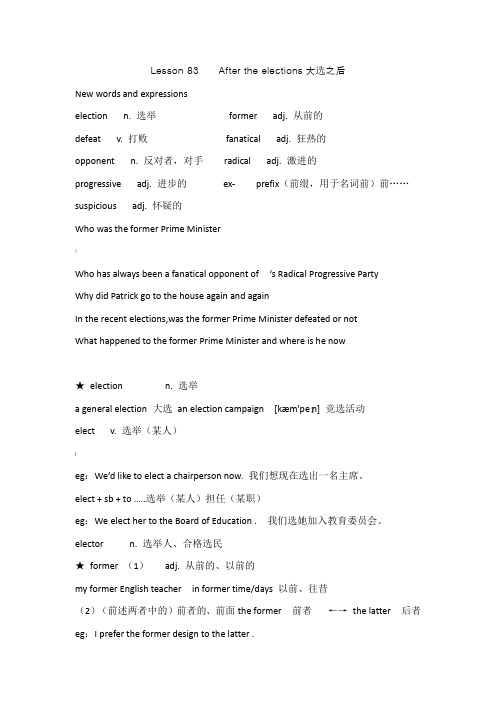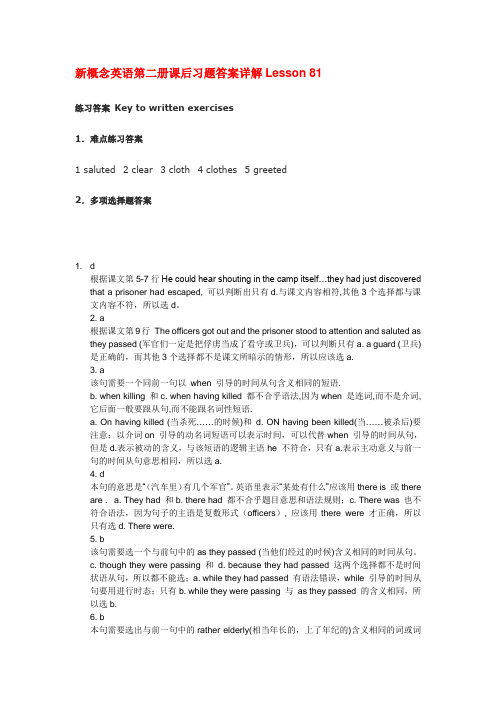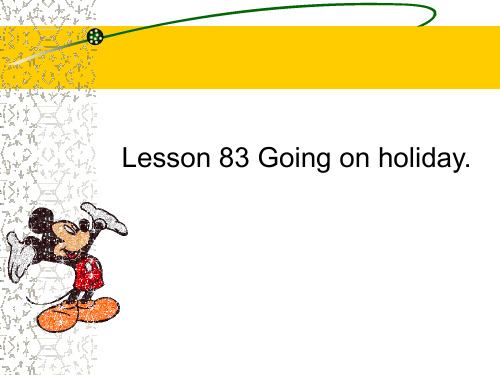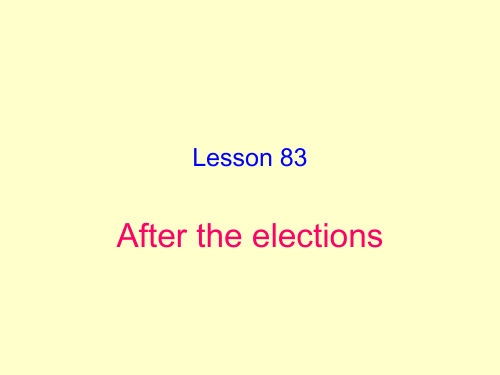新概念英语第二册83课课后习题详细答案
裕兴新概念英语第二册笔记83课

Lesson 83 After the elections大选之后New words and expressionselection n. 选举former adj. 从前的defeat v. 打败fanatical adj. 狂热的opponent n. 反对者,对手radical adj. 激进的progressive adj. 进步的ex- prefix(前缀,用于名词前)前……suspicious adj. 怀疑的Who was the former Prime Minister|Who has always been a fanatical opponent of ‘s Radical Progressive PartyWhy did Patrick go to the house again and againIn the recent elections,was the former Prime Minister defeated or notWhat happened to the former Prime Minister and where is he now★election n. 选举a general election 大选an election campaign [kæm'peɪn] 竞选活动elect v. 选举(某人)]eg:We’d like to elect a chairperson now. 我们想现在选出一名主席。
elect + sb + to …..选举(某人)担任(某职)eg:We elect her to the Board of Education . 我们选她加入教育委员会。
elector n. 选举人、合格选民★former (1)adj. 从前的、以前的my former English teacher in former time/days 以前、往昔(2)(前述两者中的)前者的、前面the former 前者←→the latter 后者eg:I prefer the former design to the latter .formerly adv. 以前、原本nowadays 现今,现在、★defeat (2)v. 打败defeat an enemy 战胜敌人、打败敌人eg:Our team defeated our opponent by 5:0.(2)n 挫折、失敗eg:Our baseball team has suffered another defeat .admit defeat 认输a decisive defeat 一個決定性的失敗a crushing[krʌʃ] /total defeat =an utter [ˈʌtə] defeat 彻底失败|★fanatical =fanatic(1)adj. 狂热的(2)n.(主义、宗教等)狂信者fan n.(口)迷、热心爱好者a baseball fan 棒球迷be crazy about ……非常喜愛..., 醉心于=be mad about …★opponent n. 反对者,对手eg:He best his opponent by three sets to one . 他以三比一击败对手。
新概念第二册-Lesson 83 After the elections

FANATICAL
fanatical /fəˈnætɪkl/ adj. 入迷的, 狂热的 fanatically /fə'nætɪklɪ/ adv. 狂热地, 盲信地 fanatic /fəˈnætɪk/ n. 入迷者, 极端分子, 狂热信徒 adj. 入迷的 E.g. Gary's fanatical about football. 加里对足球很痴迷。 -Cambridge Dictionary
OPPONENT
opponent /əˈpəʊnənt/ n. 对手, 反对者 词根词缀: 词根: pon = put 放置 opponent /əˈpəʊnənt/ n. 对手, 反对者 adj. 反对的 [op-=ob-相反, 对面 + pon放置 + -ent形容词后缀,…的 或名词后缀, 表示人] component /kəmˈpəʊnənt/ adj. 组成的 n. 组成部份, 成分 [com-共同+pon放+-ent形容词后缀,…的或名词后缀, 表示物] compound /ˈkɒmpaʊnd/ n. 混合物, 化合物, 有围栏的场地 *com- 共同 propone /prə'pəʊn/ v. 提议, 建议 *pro- 向前 proponent /prəˈpəʊnənt/ n. 提出者, 倡导者 *-ent 表示人 exponent /ɪkˈspəʊnənt/ n. 指数, 拥护者, 说明者 [ex-出, 外 + pon放, 摆 + -ent形容词后缀,…的/名词后缀] postpone /pəˈspəʊn/ v. 推迟, 延期 [post-后 + pone放] progress /ˈprəʊɡres/ v. & n. 进展, 进步 progressive /prəˈɡresɪv/ adj. 进步的 progression /prəˈɡreʃn/ n. 进展, 发展 E.g. My friend, Patrick, has always been a fanatical opponent of Mr. Lane's Radical Progressive Party. 我的朋友帕特里克一直是莱恩先生的激进党的强烈反对者。
新概念英语第二册83课

Listening and imitation
Intensive reading
Text
1. The former Prime Minister, Mr. Wentworth Lane, was defeated in the recent elections.
Explain: a. the former Prime Minister = the ex-Prime Minister 前首相 b. defeat sb 击败某人 = beat sb 打贏某人
defeat .
fanatical
(1)adj. 狂热的
(2)n.(主义、宗教等) 狂信者
fan n.(口) 迷、热心爱好者
a baseball fan
棒球迷
a rock and roll fan 摇滚迷
be crazy about …… 非常喜爱 ..., 醉心于
= be mad about …
Explain: go to 去……地方
5. When he asked if Mr. Lane lived there, the policeman on duty told him that since his defeat, the ex-Prime Minister had gone abroad.
• progressive [prə'gresɪv]• adj. 进步的
• suspicious [sə'spɪʃəs] • adj. 怀疑的
election n. (经由投票的) 选举; 当选
• a general election 大选,普选 • 举行选举
hold an election • 赢得选举,当选
新概念应第二册课后练习答案lesson81--90

新概念英语第二册课后习题答案详解Lesson 81练习答案Key to written exercises1.难点练习答案1 saluted2 clear3 cloth4 clothes5 greeted2.多项选择题答案1. d根据课文第5-7行He could hear shouting in the camp itself…they had just discovered that a prisoner had escaped, 可以判断出只有d.与课文内容相符,其他3个选择都与课文内容不符,所以选d。
2. a根据课文第9行The officers got out and the prisoner stood to attention and saluted as they passed (军官们一定是把俘虏当成了看守或卫兵),可以判断只有a. a guard (卫兵)是正确的,而其他3个选择都不是课文所暗示的情形,所以应该选a.3. a该句需要一个同前一句以when 引导的时间从句含义相同的短语.b. when killing 和c. when having killed 都不合乎语法,因为when 是连词,而不是介词,它后面一般要跟从句,而不能跟名词性短语.a. On having killed (当杀死……的时候)和d. ON having been killed(当……被杀后)要注意:以介词on 引导的动名词短语可以表示时间,可以代替when 引导的时间从句,但是d.表示被动的含义,与该短语的逻辑主语he 不符合,只有a.表示主动意义与前一句的时间从句意思相同,所以选a.4. d本句的意思是“(汽车里)有几个军官”。
英语里表示“某处有什么”应该用there is 或there are . a. They had 和b. there had 都不合乎题目意思和语法规则;c. There was 也不符合语法,因为句子的主语是复数形式(officers), 应该用there were 才正确,所以只有选d. There were.5. b该句需要选一个与前句中的as they passed (当他们经过的时候)含义相同的时间从句。
新概念英语第83课现在完成时

2.不规则动词
Eg.
go—went—gone see---saw—seen forget—forgot--forgotten
用法一: 1)现在完成时表示过去发生的动作,并对现在有影响。 Someone has broken the window. I have already lost the key. I haven’t read that book yet . I have just cleaned my hands.
现在完成时
表示过去发生的某一动 作对现在造成的影响或 用法一: 产生的结果.现在完成时 这一时态强调是过去动 作与现在的联系,也就是 强调现在的影响和结果.
现在完成时
I bought an apple. I have an apple.
past
One minute ago
present
now
I have bought an apple.
(窗户现在是坏的) (我现在没有钥匙) (不了解书的内容)
(手是干净的)
常与already(已经), yet(已经), just(刚刚),ever(曾经) never(从不)等词连用. already: 常用于肯定句中. yet: 常用于否定句,疑问句尾.
改写句子 1.My father came back from the bookshop just now. My father ______ ________ ______ has just returned from the book shop. 2.He began to do his homework this afternoon. has already_______ begun to do his homework He _____ this afternoon. 3.I didn't know that book. haven't I ______ _________that book yet. known 4.They never met him . have never ______him. met They ______ Have met ________they ever ______him? they __________ No,______ haven't
新概念英语第二册Lesson83

defeat
(1) v. 打败 • 打敗敌人 • defeat an enemy • 我隊以5比零擊敗對手。 • Our team defeated our opponent by 5:0. (2) n 挫折、失敗 • 我們的棒球隊再遭失敗 • Our baseball team has suffered another defeat .
• (2)可疑的,令人起疑的: • You get a lot of suspicious-looking people in this bar. • 你这个酒吧里有许多人看上去很可疑。 • The car crash looks suspicious. • 这个撞车事故看上去可疑。
temper与mood
After the elections, Patrick went to the former Prime Minister's house. • go to 去……地方
• temper指"心情"、"情绪"时,与mood同义: • That morning George was in a good mood/temper. 那天上午,乔治心情好。 • 但bad mood与bad temper稍有区别: • When he is in a bad temper, he gets angry easily. But when he is in a bad mood, he likes to sit alone. 当他脾气不好 时,他很容易生气。但当他心情不好时, 他喜欢独自坐着。
• • • • • • • • • •
progressive (1) adj. 进步的 ←→ conservative a.保守的,守舊的;傳統的 n.保守的人 思想進步的市長 a mayor with progressive ideas 新主席是相當前卫的。 The new chairman is quite progressive . (2) 前進的、進行的 ←→ regressive a.退步的,退化的
新概念英语第二册第83课-After the elections

新概念英语第二册第83课:After the electionsLesson 83 After the elections大选之后First listen and then answer the question.听录音,然后回答以下问题。
Why did Patrick keep on asking the same question?The former Prime Minister, Mr. Wentworth Lane, was defeated in the recent elections. He is now retiring from political life and has gone abroad. My friend, Patrick, has always been a fanatical opponent of Mr. Lane's Radical Progressive Party. After the elections, Patrick went to the former Prime Minister's house. When he asked if Mr. Lane lived there, the policeman on duty told him that since his defeat, the ex-Prime Minister had gone abroad. On the following day, Patrick went to the house again. The same policeman was just walking slowly past the entrance, when Patrick asked the same question. Though a little suspicious this time, the policeman gave him the same answer. The day after, Patrick went to the house once more and asked exactly the same question. This time, the policeman lost his temper. 'I told you yesterday and the day before yesterday,' he shouted, 'Mr. Lane was defeated in the elections. He has retired from political life and gone to live abroad!"'I know,' answered Patrick, 'but I love to hear you say it!'参考译文前首相温特沃兹.莱恩先生在最近的大选中被击败。
新概念英语第二册Lesson83 After the elections

Lesson83 After the electionsEveryday EnglishBetter late than never. 迟做总比不做好。
Key Structures副词的用法(二)副词在句中的位置1)多数副词作状语时放在动词之后。
如果动词带有宾语,则放在宾语之后。
例如:Mr Smith works very hard.She speaks English well.2)频度副词作状语时,通常放在行为动词之前,情态动词,助动词和be动词之后。
例如:He usually gets up early.I’ve never heard him singing.She is seldom ill.3)程度副词一般放在所修饰的形容词和副词的前面,但enough作副词用时,通常放在被修饰词的后面。
例如:It is a rather difficult job.He runs very fast.He didn’t work hard enough.4)副词作定语时,一般放在被修饰的名词之后。
例如:On my way home,I met my uncle.The students there have a lot time to do their own research work.5)部分常用副词的用法(1) very,much这两个副词都可表示“很”,但用法不同。
Very用来修饰形容词和副词的原级,而much用来修饰形容词和副词的比较级。
例如:She is a very nice girlI’m feeling much better now.Much可以修饰动词,而very则不能。
例如:I don’t like the idea much.They did not talk much.(2)too,either这两个副词都表示“也”,但too用于肯定句,either用于否定句。
例如:She can dance,and I can dance,too.I haven’t read the book and my brother hasn’t either.(3)already,yetalready一般用于语肯定句,yet一般用于否定句。
- 1、下载文档前请自行甄别文档内容的完整性,平台不提供额外的编辑、内容补充、找答案等附加服务。
- 2、"仅部分预览"的文档,不可在线预览部分如存在完整性等问题,可反馈申请退款(可完整预览的文档不适用该条件!)。
- 3、如文档侵犯您的权益,请联系客服反馈,我们会尽快为您处理(人工客服工作时间:9:00-18:30)。
新概念英语第二册课后习题答案详解Lesson 83
练习答案Key to written exercises
1.难点练习答案
1 He refused to help us and I lost my temper with him.
2 They were very rude but I managed to keep my temper.
3 He isn't usually in such a good temper on a Monday morning!
4 Don't ask him for a rise now. He's in a very bad temper today.
5 She's just won a prize in the lottery, so she's in a very good mood.
6 He's just lost a lot of money, so he's in a very bad mood.
7 Let's go out. I'm in the mood for a celebration!
2.多项选择题答案
1. b
2.根据课文内容可以推测只有b. 是正确的,课文所暗示出如果温特沃兹莱恩先生在最近
的大选中获胜,他还会当首相的,但事实上他没有获胜。
只有b. 与这一暗示相符,其他3个选择都与课文的内容不符。
3. 2. a
4.根据课文最后一行but I love to hear it, 可以判断a. 是课文所暗示的情形,其他3个选择
都与课文含义不符。
5. 3. c
6.本句的前半部分用的是现在完成时he has always been a fanantical opponent (他一直是
强烈的反对者),后半部分只有用一般现在时才能与前面的时态协调,并合乎逻辑。
应该选c. 其他3个选择都不对:a. has been 是现在完成时,与前面时态重复,意思不同;
b. was 是过去时不合乎逻辑;d. has 不合乎题目意思,此外需要的是动词be,而不是have.
所以c. 是最佳答案。
7. 4. c
8.只有选c. to 才符合习惯用法,因为be opposed 后面需要同介词to 搭配才能构成固定
短语,be opposed to 意思为“反对”,其他3个选择都不能同opposed 连用,所以应该选c.
9. 5. a
10.该句需要选一个与前一句中的连词if(是否)意义相同的词,才能使两个句子意思相同. 只
有a. whether (是否)与if 意义相同,其他3个选择b. that , c. unless(如果不,除非)和d.
providing that (以……为条件,假如)都与if 的含义不同,所以选a.
11.6. b
12.只有选b. of 才符合习惯用法,因为句中的suspicious 后面只能跟介词of 或about 构
成固定短语,be suspicious of/about 意思是“对……感到怀疑”,其它3个选择都不能与suspicious 连用,所以选b.
13.7. c
14.本句的时间状语是for some time (一段时间)表示一段时间的状语应该同完成时态连用才
合乎逻辑;a. has gone 是完成时,但它表示的是瞬间完成的动作,不应该同表示一段时间的短语来年用;b. went 和 d. did go 都不是完成时;只有c. has been 是完成时,可以同表示一段时间的短语连用,表示某种状态持续的时间,所以应该选c.
15.8. b
16.本句需要一个同前一句中的形容词former (先前的,过去的)含义相同的词。
a. first (第
一的);b. previous (先的,以前的);c. latter (最近的);d. before (以前,在……之前)中,只有b. 与former 的意义和词性相同,所以选b.
17.9. c
18.本句需要选一个同前一句中的defeated (被击败)含义相同的词。
a. conquered (被征服
的),b. won (被赢得的,胜利的);c. beaten (被击败的);d. destroyed (被毁坏的)中,只有
c. 与defeated 的意义相同,所以选c.
19.10. d
20.只有选d. against 才能使此句与前一句Patrick has always been a fanatical opponent(帕特
里克一直是强烈的反对者。
)的含义协调一致。
而若选a. opposite(对面)与前一句意义不符,b. anti 一般不能单独使用,它常做前缀表示“反对”,“防”“抗”等,在口语中可以做名词或形容词,意思为“持反对态度的人”,“反对的”,也不适合这个句子, c. at 意思讲不通。
21.所以d. 是答案。
22.11. a
23.本句需要选一个同前一句中的lost his temper (生气,发脾气)含义相同的词组。
a. got angry
(生气);b. was in a bad mood (心境不好);c. lost his nerve (畏缩,害怕);d. was in a bad humour (情绪不好,不高兴)中,只有a. 与lost his temper 意义最接近,所以选a.
24.12. b
25.本句是需要选一个与前一句中的election (选举)意义相关的词,才能使其意义与前一句
符合。
a. marks (分数,记号);b. votes (投票,选票);c. points (点,得分);d. grades (等级,成绩,分数)中,只有b. 的词意义与election 有关,而其他3个选择意义相同,一般都不用来指选举的得票数,所以b.是最佳答案。
